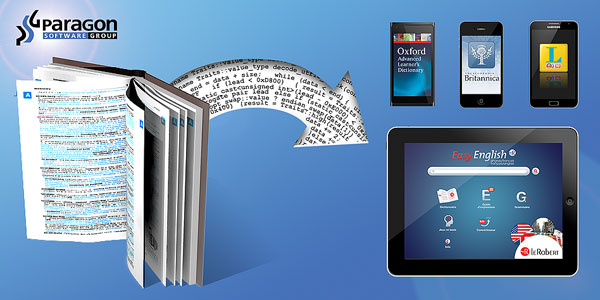Katia Shabanova from Paragon Software Group, provides us with a substantial essay exploring what publishers entering the mobile market need to know: an introduction to how to turn gigantic print reference content into lightweight apps with cutting-edge features
![]() Katia Shabanova from Paragon Software Group, provides us with a substantial essay exploring what publishers entering the mobile market need to know: an introduction to how to turn gigantic print reference content into lightweight apps with cutting-edge features
Katia Shabanova from Paragon Software Group, provides us with a substantial essay exploring what publishers entering the mobile market need to know: an introduction to how to turn gigantic print reference content into lightweight apps with cutting-edge features
The digital market is a highly variable structure, where revenue level depends on a popularity of a certain operating system. Platforms continuously replace each other, winning market share, bringing unexpected breakthrough and ruining hopes. A cross-platform approach is the core of a long-term strategy, guaranteeing no risk at any time.
Since its launch in 1994, Paragon Software has brought to the mobile market more than 2,000 apps, based on the advanced Slovoed compression technology that compresses even the largest known print volumes, such as Britannica Concise Encyclopedia and Webster’s Third New International Dictionary, Unabridged to the tiniest apps taking the minimal memory space on the device. This Slovoed technology makes it possible for publishers to offer their titles for all available platforms – desktop, mobile or web-based – broadening appeal to a range of consumers while also decreasing time-to-market. The essentials of the digital development process include:

1. Reliable conversion technology to re-create the brand
A publisher’s first steps to the mobile world begin with converting print content from PDF, MS Word, InDesign, MS Excel or other formats into the engine-compatible digital format. The biggest challenge and the end goal of a successful conversion is to communicate all brand elements into a mobile version. This is the developer’s ultimate goal – to present the mobile user with the same design, look, colors, logo and other layout components as the print edition.
In order to provide a complete brand correspondence and the maximum comfort and benefits for the end-user, the smart Slovoed technology structures dictionary entries by separating them into components such as usage examples, translations, phonetics, parts of speech, tables, pictures, and other groups. The structuring operation permits the developer in agreement with the publisher to add to the app new advanced features, such as colored markup, hyperlinks between articles and directions (for example, English-French or French-English), a possibility to hide or display specific information (usage examples, comments, etymology, etc.) in the article for a more customized view on a mobile device, and many other features.
2. Simultaneous multi-platform development
The key point, which a publisher should consider when entering a digital dictionary market, is that it’s a highly variable structure, where revenue level depends on a popularity of a certain platform (Operating System). Platforms continuously replace each other, winning market share, bringing unexpected breakthrough and ruining hopes. Thus, some titles for Mac OS bring more revenue than those for Android. It’s all relative. This instability of the digital dictionary market raises tricky questions to publishers: which platform to choose? How to secure one’s investments in case of poor performance of a new platform (bada, Windows Phone, BlackBerry, etc.)? Is there a solution to avoid these risks for publishers?
Paragon Software has it. Slovoed dictionary technology ensures stable revenue level by providing multiple platform support. The Slovoed engine supports more than 15 platforms. From Palm OS, Java, UIQ and Symbian to Android, iOS, Mac OS and Windows 8, all have been covered by Slovoed technology up to date. Paragon’s 18 years of experience has proved that a cross platform approach is the core of a long-term strategy in digital dictionaries. To implement the idea the multiple platform support, Slovoed technology uses Device Agnostic Data Format (DADF), which is a result of Paragon’s 13 years of development process. DADF is a digital data format, which does not depend on the operating system that it has to be implemented into.
Using DADF simplifies the development of the product to shell migration only and reduces development costs per title (e.g. DADF incorporates the keyword list, articles, sound, morphology, grammar, etc.) For example, one database developed for iOS can be used on another platform (e.g. Android) without the database recast. In conjunction with multiple development teams (one per platform) that can work on many dictionary projects simultaneously, Slovoed’s cross-platform approach decreases a product’s time-to-market and guarantees stable revenues for dictionaries.
3. Innovative end-user features to take advantage of the device’s capabilities
Recent services and technologies, for example from Google and Apple, have raised the consumer’s expectations so highly that third-party developers have to create apps with features to meet these new requirements. Slovoed technology for mobile and desktop platforms offers premium opportunities for users to translate and learn languages. Seven intelligent search tools, full sentence audio pronunciations recorded by native speakers, grammar tables, vocabulary tests, next generation input options, a friendly UI and many other features, guarantee very fast translation in the most intuitive app possible. Below are just a few essential features, powered by Slovoed:
- Morphology module analyzes a word form and provides translation for words entered in any grammatical form (plural nouns and adjectives, different verb forms, etc.). Since most words occur in speech in inclined or conjugated forms, it may be tricky for a language beginner to figure out an infinitive and to get a proper translation. Morphology modules solve this problem.
-
Full text search (for Android, iOS and Mac). Released in 2013, a new full text search function allows users to look up a word not only through dictionary keywords, but also through all available translations and usage examples in the entire dictionary. The app quickly delivers comprehensive results that offer users instant access to all available content, along with a thorough analysis of all findings. For example, by typing the word “taste”, the user will see not only the entries and links to the most relevant articles but also words such as “discriminating”, “educated”, and others that provide additional examples of phrases with the word “taste”. As a result, the translation becomes the most comprehensive and detailed possible.
- When a user enters a query into the input field, the Slovoed engine automatically builds a list of different entries through the entire dictionary that contain the query.
- Slovoed finds precise word translations containing all usage examples.
- Because full text search involves the morphology module and ‘Did you mean…?’ functionality, Slovoed finds almost all search queries regardless of misspelling or grammatical word form.
-
Slovoed displays search results in both dictionary languages (for bilingual apps).
-
Handwriting input. Along with powerful search options, Slovoed allows users to write words or phrases by hand without using a keyboard. This new handwriting recognition capability is enabled through the integration of Paragon’s proprietary handwriting recognition PenReader technology that supports 35 world languages.
4. Trim the sails to the wind: marketing
After app development has been finished, the most important next step is to market this new product and submit it to online sales channels, such as the iOS App Store, Google Play Store, Amazon App Shop, Windows Phone Store, and others. Paragon Software is a leading expert in marketing services, successfully managing more than 2,000 reference applications in the company’s own online distribution platforms, and every major app store is known. But is that enough for a long-term strategy? Is there a “life” outside app stores?
5. Web Services
Let’s look closer at the user interaction patterns for mobile and desktop devices. Global giants like Apple and Google influence it, once again. Thus, iOS 6 with its iCloud Tabs allows users to sync browser tabs between different devices and continue viewing the page right where it was left on a previous device. A similar technology is supported now in a recent version of Google Chrome for iOS. As a result, the user gets a hitherto unknown mechanic of cross-platform content consumption on multiple devices and browsers with seamless access to content of interest.
Paragon Software has applied the trend to mobile and desktop apps and introduced the Slovoed Online dictionary web-service. Now users of mobile dictionary apps, powered by Slovoed technology, can get free access to their dictionaries online and, what’s more important, synchronize their search history. No matter where the user is situated – in the office in front of a laptop or on the go with a smartphone in hand, they get the desired content in the most comfortable way and in accordance with their context.
6. Open Dictionary API Initiative
Another latest initiative by Paragon Software, aimed at integration of new opportunities for promoting dictionary apps, is an agreement with the Open Dictionary API Alliance (ODAA). It is the first non-profit open community that provides open versions of in-app translation tools to software developers and organizations. Now third-party developers of e-books, journals, encyclopedias, office documents and social media apps for Android and iOS can integrate instant in-app word translation functionality and cutting-edge dictionaries into their own apps without any fees. Through this integration, mobile users can read foreign literature and documents in multiple languages without leaving the active application.
Paragon’s proprietary Slovoed dictionary engine, a highly advanced compression technology that is especially optimized to handle large reference content of all types on all mobile platforms, condenses even the weightiest content to minimal memory space and provides the fastest definition look-up.
Slovoed Dictionary Technology: Brief Facts & Numbers
- In the mobile reference business since 1994
- 2,000 apps powered by the Slovoed engine: dictionaries, phrasebooks and encyclopedias
- 35 languages
- 40+ features
- 15+ OS support, including Android, BlackBerry, iOS, Mac OS, Windows Phone, Windows 8
- Millions of users worldwide
- Dozens of worldwide partners, including Collins, Duden, Langenscheidt, Merriam-Webster, Oxford, PONS GmbH.
Slovoed compression technology has been already employed by dozens of publishers around the globe. The digital dictionary market is maturing, providing new opportunities not only for large and prominent publishing houses, but for smaller, regional authors as well. Independent authors come up with rare reference editions adding new languages, unique dialects and very specialized vocabulary to the wide spectrum of already established and traditional reference and learning brands. Paragon Software encompasses all languages and dialects, all brands and niches, creating apps to satisfy all mobile user reference and learning needs.
Paragon Software Group is an innovative software developer focused on two dynamic growth markets. The company’s comprehensive product line for the data storage market addresses the needs of data security, storage and management for PCs, servers and networks. A second portfolio of products focuses on mobile productivity applications for handheld devices. Paragon Software Group’s lineup of effective, quality reference applications enrich mobile learning for users of 35 global languages with more than 2,000 electronic dictionaries, encyclopedias and phrase books developed in conjunction with the world’s leading publishing houses, such as Duden, Berlitz, Langenscheidt, Merriam-Webster, Oxford, PONS, Le Robert, VOX, and others. Founded in 1994, Paragon Software Group has offices in the USA, Germany, Japan, Poland, Russia and China.
![]() www.paragon-software.com
www.paragon-software.com![]()
![]()
![]()


Katia Shabanova
is director of public relations at Paragon Software Group. Ms. Shabanova studied linguistics at Moscow State Linguistic University and University of Texas at Austin; English and German philology at Santa Clara University, California; and earned Master of Arts degrees in English and German Philology at Georg-August University of Göttingen, Germany. Prior to joining Paragon Software Group in 2007, she worked for three high-tech public relations agencies in Silicon Valley, California. You may contact her at kshabanova@paragon-software.com or connect with her on LinkedIn http://tinyurl.com/8nxzeou.
Don’t forget … we encourage you to share your discoveries with other readers. Just send and email, contribute your own article, join the Design Cafe forums, or follow DTG on Facebook!